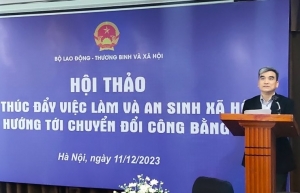INTERNATIONAL INVESTMENT
AND PORTAL
Shortcomings in legal policies on trade unions and other labour organisations are causing some difficulties for businesses during implementation.
Legislation on guiding the new labour organisations has been drafted for over three years, and the draft decree has not yet been presented for public input. As a result, even with the Labour Code taking effect from 2021, no new labour organisation has been established due to the absence of a comprehensive legal framework.
 Gabor Fluit, former chairman, European Chamber of Commerce in Vietnam
Gabor Fluit, former chairman, European Chamber of Commerce in Vietnam
Moreover, the Labour Code does not clarify the relationship between a new labour organisation and a traditional union, if both organisations exist within the same enterprise. In principle, since employees can choose their representative organisations freely, both types of organisations should have equal rights to represent their members.
These roles would encompass all responsibilities and rights related to representation, such as consulting on internal regulations, documents, and processes relating to the employment relationship as required by law; attending and representing employees in communications, dialogue, and discussions with the employers and with other union organisations; and collecting, utilising, and managing trade union fees and union membership fees.
However, there is no provision under the Labour Code to indicate the relationship between the two types existing in the same enterprise, nor on their roles in representing employees. In the relevant laws it should be explicitly stated that the unions will have equal rights and obligations in representing the employees, depending on the ratio of their member employees, and provide mechanisms for cooperation between a new labour organisation and a traditional union in matters relating to employment relationships.
Financing for new labour organisations is also ambiguous. Article 174 regulates that their charter must include contents on “membership fees, source of property and finance, and its usage and management of the organisation”, and that the government shall detail regulations of this article. As such, it is unclear on the level of discretion that a new labour organisation would have in deciding its financing structure.
According to the current Law on Trade Unions, the employer has to contribute monthly trade union fees equal to 2 per cent of the total payroll used for the calculation of social insurance to the upper-level trade union, even if there is no trade union within their organisation. Furthermore, according to the Vietnam General Confederation of Labour, an enterprise can only retain part of such an amount when there is a grassroots trade union within their organisation. This does not align with the principles of employees’ freedom to collect, manage, and use their financing structure.
In this light, it is important to ensure trade union laws indicate that the monthly employer-contributed trade union fees should go directly and entirely to the employees’ representative organisations at a grassroots level, including both new labour organisations and traditional unions, and the funds should not be shared with the upper-level traditional trade union. These funds should also be distributed between each union organisation based on the ratio of member employees it represents.
The employees’ representative organisations at the grassroots level should have the right to use the entire trade union fees contributed by employers and union membership fees contributed by their member employees. Furthermore, if no employees’ representative body exists yet, employers should hold onto the trade union fees and then transferred to the corresponding employees’ representative organisations once such organisations are established.
The trade union fees borne by the employer should be revised by carrying out an actual survey of the opinions of enterprises, balancing the budget of the trade union system and considering reducing the rate from 2 per cent to 1 per cent of the payroll of local employees used for the calculation of social insurance; and the payroll of foreign employees should not be used as a basis to calculate monthly trade union fees.
European businesses would like to make some recommendations like announcing the draft decree for public feedback, clarifying the role and relationship when both a new labour organisation and a traditional union coexist within a same enterprise in guiding regulations of the new Labour Code 2019 and the amended Law on Trade Union. It would also like amendments to financing regulations for both types of organisations to ensure clarity, prudence, equality, and that it correctly reflects the rights of employees’ representative organisations.
 Singapore promotes plans to fine-tune foreign labour policies
Singapore promotes plans to fine-tune foreign labour policies
Prime Minister Lee Hsien Loong has said Singapore would adjust its policies towards foreign workers to address concerns about employment amid the COVID-19 pandemic.
 High-quality overseas labour keen on Vietnam shift
High-quality overseas labour keen on Vietnam shift
Vietnam’s promising economic factors could lead to more foreign workers and overseas Vietnamese entering the country to live and work.
 Labour market can evolve through just transition
Labour market can evolve through just transition
A green transition will present an invaluable opportunity to strategically plan for a positive influence on the labour market and enhance social security measures, a recent workshop has heard.
By Gabor Fluit



















